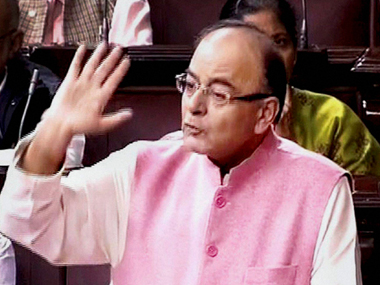For the third time in two months, finance minister, Arun Jaitley, has been forced to go back on his words on the Employee Provident Fund Issue (EPF). The latest reversal came on Friday when the finance ministry increased the EPF interest rate to 8.8 per cent from 8.7 per cent approved earlier. The Central Board of Trustees (CBT) had originally recommended 8.8 per cent but the government decided to lower the rate to align with interest rates in the economy. The reversal came after trade unions threatened nationwide protests to press their demand. [caption id=“attachment_2750740” align=“alignleft” width=“380”]  A file photo of Arun Jaitley. PTI[/caption] If one looks at the larger economic picture, the move is disappointing, since lowering interest rate on EPF was perceived to be a right move to usher in lower interest rate regime in the economy. As a first step, the government had slashed returns on small savings schemes such as post office savings and other small savings schemes having shorter tenure. Unless savings rate come down, banks wouldn’t lower their deposit rates and, later, lending rates. In fact, higher rates offered on small savings schemes is one of the major reasons why bank lending rates haven’t come down in the economy despite a 150 bps a rate cut by the Reserve Bank of India (RBI) since January,2015. The government couldn’t have left only the EPF rate untouched after cutting rates on other small savings rate. That would have amounted to artificially protecting one asset class. That’s the reason economists lauded when finance ministry went against CBT’s proposal and cut the EPF rate. But, with the latest U-turn, the government has yet again proved its lack of determination to implement bold economic decisions. If the finance ministry was so sensitive about the public backlash, it shouldn’t have dared to lower the EPF rate in the first place only to reverse the decision at the first hint of disagreement-not after experiencing public backlash on the same issue twice within two months. It clearly shows Narendra Modi-government’s backroom strategists aren’t just getting it right when it comes to dealing with the pension funds of India’s salaried class. Besides, it also shows the intellectual drought in Modi’s cabinet, especially in the finance ministry and the bureaucracy advising the minister on this issue. Particularly, PF should be the least issue to experiment with in an election season. For many people, PF is the only major retirement savings for most of the salaried class in India, where there is no social security system for pensioners unlike developed countries. Messing with EPF was a blunder in the first place. Repeated policy flip-flops do not augur well for any government, especially when state-elections are due. Unlike the previous two occasions when the points of disagreement were taxation and age limit for withdrawal of funds, this time the trade unions didn’t have a strong case. The argument that a 10 basis points reduction in the EPF rate will damage the retirement kitty of the pensioners is a baseless fear in a falling inflationary scenario (CPI inflation is hovering around 5 per cent and the RBI expects to bring it down even further), the real returns will be positive. In that sense, an 8.7 per cent rate of return is not at all bad. If PF reforms are the idea, the government should have come with a full-fledged, well-thought-out policy after consulting all the stakeholders. Probably, it was poorly advised and chose to unveil bits of half-baked ideas without consulting the trade unions—the biggest stakeholders in this case — only to withdraw later. Poorly though out decisions and repeated U-turns on issues such as EPF wouldn’t earn any brownie points to Jaitley.
For the third time in two months, finance minister, Arun Jaitley, has been forced to go back on his words on the Employee Provident Fund Issue (EPF). The latest reversal came on Friday when the finance ministry increased the EPF rate to 8.8 per cent from 8.7 per cent decided earlier.
Advertisement
End of Article


)

)
)
)
)
)
)
)
)



